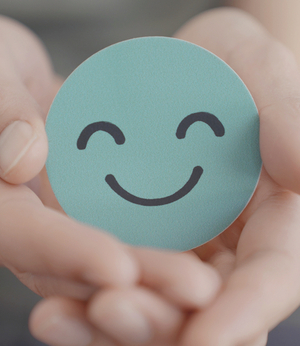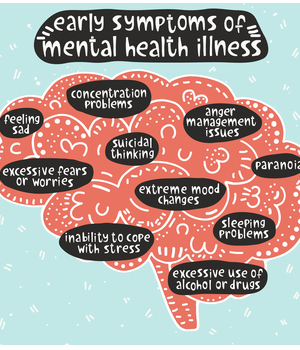Reading Time: 16 minutes

This resource guide offers information on the current mental health of college students and shares dozens of the resources available to provide crucial support.
Finals. Term papers. Relationships. Money. College students have a lot to balance during their educational careers. Stressors can add up quickly, and school-related issues are only part of the picture. Students must also manage family, work, and personal challenges. With so much on their plates, it should come as no surprise that college students often struggle with mental health issues.
Anxiety, depression, substance abuse, and other disorders are common. For many students, the issues become so overwhelming that they don’t finish their education. The National Alliance on Mental Illness (NAMI) found that 64% of students who dropped out of college did so because of mental health problems.1
Fortunately, support services are available to turn the tide on these numbers. Campuses across the nation now recognize the need for student mental health resources, and most colleges offer multiple services. National organizations have also stepped up to help. From mental health apps to on-campus groups, college students have access to myriad resources.
College Student Mental Health Statistics
A look at the numbers reveals the state of mental health among college students today.2
35% of students have been diagnosed with a mental health disorder.
Mental health disorders ultimately prompt 67% of students drop out of college.
Of those college students who drop out due to mental health disorders, 50% never access mental health services.
Around 25% of college students struggle with bipolar disorder, which causes extreme mood swings and impacts sleep, energy, and judgement.
34% of college students are diagnosed with anxiety, which causes restlessness, fatigue, difficulty concentrating, headaches, feelings of worry, and sleep problems.
39% of students are diagnosed with depression, and 33% of those students ultimately drop out of college due to the effects of this mental health disorder.
Common Mental Health Issues For College Students
What’s driving these statistics? College students face a variety of stressors, struggles, and mental health issues. Some of the most common challenges include:
Addiction and Substance Use Disorders in College Students
Students often turn to substances to cope with stress or a mental health disorder. Too often, this leads to substance use disorders, and if students don’t receive treatment for addiction, it can easily destroy lives.
Recent research has revealed that 37% of college students regularly use an illegal drug or abuse alcohol.3 Binge drinking is particularly rampant among college students, with 40.5% of students who drink reporting binge drinking.4
37% of college students regularly use an illegal drug or abuse alcohol, and 40.5% of the students who admit drinking alcohol say they take part in binge drinking.4
ADHD in College Students
Success in college requires organization and time management. These skills are difficult for students who have ADHD. Maintaining a full class load and completing assignments on time can feel overwhelming. Research suggests that students with ADHD “experience greater emotional distress and psychological difficulties than other students.”5
To cope with their stress, students may turn to substance use. Research shows that college students with ADHD typically report greater alcohol and drug use than do their peers.6
Anxiety Disorders in College Students
 The number of students being treated for or diagnosed with anxiety disorder in the last 12 months doubled between 2008 and 2016. This rate appears to be highest when students approach graduation.6
The number of students being treated for or diagnosed with anxiety disorder in the last 12 months doubled between 2008 and 2016. This rate appears to be highest when students approach graduation.6
A senior is 65% more likely to be diagnosed or treated for anxiety disorder than a freshman.6 However, research has also shown that psychological distress, including anxiety, rises during a student’s first semester at college and remains high throughout that initial year.7 This sharp increase likely occurs due to the transition from high school to college life.
Throughout their college careers, students remain in a state of “transition” – from adolescence to adulthood, from student to professional, from dependent to independent. In the midst of such a major life transition, along with the everyday stresses of the collegiate environment, anxiety is prevalent.
Bipolar Disorders in College Students
Bipolar disorder is characterized by alternating periods of manic activity and extreme depression. Because college students often experience stress and fatigue due to high workloads, symptoms of bipolar disorder may be overlooked. Symptoms may be seen as mood swings or other minor emotional stress when they are actually indicators of a major mental health disorder.
Severe mood swings can negatively impact a student’s day-to-day functioning. If bipolar disorder is not treated, the student will likely suffer academically and personally.
Eating Disorders in College Students
The National Eating Disorders Association reports that roughly 20% of female and 10% of male college students struggle with eating disorders. Anorexia and bulimia are the most common eating disorders.8 These conditions can be devastating to a students’ health if not treated.
In some cases, students who are trying to manage a busy schedule don’t make the time or effort to eat properly, which can lead to an eating disorder. Others may feel pressure to look thinner or lose weight and develop an eating disorder due to this pressure.
Depression/Suicide in College Students
A recent study of 67,000 college students discovered that 20% of students have had thoughts of suicide.9
At least a third of college students struggle with depression.2 The typical college environment that combines poor eating habits, little sleep, and lack of exercise offers the perfect recipe for depression.
It is under these conditions that students try to balance work, classes, and relationships. Often, it feels like too much. A recent study of 67,000 college students discovered that 20% of students have had thoughts of suicide. Nearly half of those students made an attempt.10
Self-Injury in College Students
The stress of college life can trigger self-injury behavior. Students may self-harm to cope with intense feelings such as anger, sadness, or loss of control. Students may feel powerless or emotionally numb or unable to express emotions, and these conditions can contribute to a desire to self-harm. Common self-injuries include burning, cutting, and scratching. Severe forms of self-injury increase the risk of suicide.11 A 2020 Healthy Minds study found that 23% of college students inflicted harm upon themselves in the past year.12
Sleeping Issues and Disorders in College Students
 Multiple types of sleep issues and disorders are frequently reported in college students, including insomnia, restless leg syndrome, nightmares, circadian rhythm disorders (CRDs), narcolepsy, obstructive sleep apnea, and affective disorders.13
Multiple types of sleep issues and disorders are frequently reported in college students, including insomnia, restless leg syndrome, nightmares, circadian rhythm disorders (CRDs), narcolepsy, obstructive sleep apnea, and affective disorders.13
Researchers have found that 27% of all university students are at risk of at least one sleep disorder, and approximately 69% of college students experience insomnia.14
These sleep disorders can severely impair student’s academic success and mental health. Poor or inadequate sleep causes daytime sleepiness, which affects mental alertness, concentration, and the ability to deal with tasks that require problem-solving, attention to detail, and memory.
As a result, college students who experience sleep disorders are at higher risk of academic failure and mental health issues.14
Schizophrenia in College Students
Individuals with schizophrenia typically experience their first psychotic episode when they are 18 to 24 years old.15 This puts them at college age. Often, the signs of this disorder are missed because the erratic behavior it causes is blamed on school-related stress, lack of sleep, or excitement. Fortunately, when diagnosed and treated, schizophrenia is often manageable, and students with this disorder can complete their degree.
Struggles With Identity in College Students
For most students, college is not only a time of academic learning, but also learning about oneself. Students wrestle with who they are in relation to their family of origin, their ancestry, and who they want to become personally and professionally. They must decide what groups to align themselves with, and they may experience rejection during this journey.
This struggle with identity can be healthy and help students grow into strong adults. However, it may also involve painful experiences that can create or exacerbate existing mental health issues.16
Students struggling with identity or any of the above issues can reach out for support from the following resources.
On-Campus Mental Health Support Services for College Students
 Campus Advocacy Groups: These student-led groups are created to teach students about mental health, de-stigmatize mental health issues, and offer a support network. Some groups are affiliated with larger organizations, while others are independent, on-campus groups.
Campus Advocacy Groups: These student-led groups are created to teach students about mental health, de-stigmatize mental health issues, and offer a support network. Some groups are affiliated with larger organizations, while others are independent, on-campus groups.- Campus Mental Health Centers: These centers help students cope with mental health challenges. Students can seek services, even if they aren’t in crisis. Many campuses offer teletherapy, and services may extend to include counseling for students struggling with substance use. Most institutions provide these mental health services for free or at affordable rates.
- Counseling Centers: A university or college counseling center offers mental health and other services for students. These centers, available on most campuses, are available to help with any and all problems students are facing that interfere with their school performance. Information about a school’s counseling center is usually available on the school’s website under student health services or student resources.
- Disability Centers: Nearly every university and college in the country has a disability center. This office works with students who have disabilities. These staff are responsible for making sure classes and other services are accessible to students with disabilities.
- NAMI On Campus: These are student-led clubs that educate the campus community about mental health issues, offer support to students, and promote services and supports to students facing mental health issues.
Off-Campus Mental Health Support Services
Crisis and Support Lines
- NAMI: Call 800-950-NAMI or text NAMI to 741741 – Get answers, support, and practical next steps. This National Alliance in Mental Illness helpline can be reached M-F 10am-10pm ET.
- National Suicide Prevention Hotline: 800-273-8255 Available 24/7, offering confidential support for people in distress or who know someone in distress.
- SAMHSA’s National Helpline: 800-662-HELP. Free, confidential, treatment referral and information services available 24/7, 365 days a year, for individuals facing mental and/or substance use disorders. Available in English and Spanish.
- ULifeline: Call 800-273-TALK or text START to 741-741 for confidential support.
Online Mental Health Support Groups
- Anxiety and Depression Association of America: Offers free, safe, supportive places for students to share information and experiences and connect with others experiencing similar disorders.
- Depression and Bipolar Support Alliance: These online support groups give students living with bipolar disorder and depression a safe place to share experiences, coping skills, and hope.
- Support Groups Central: Search for online support groups by area of interest (depression, mental health, life skills, etc.).
Best Apps for Mental Health
Best Overall – Moodfit: A free app that allows users to track their mood and offers exercises to help deal with negative emotions. Pros & Cons – Customizable based on goals, but lacks access to professional help.
 Best for Therapy – BetterHelp: Therapists offer online therapy and counseling services via video chat, audio, and messaging. Cost varies $240-$600. Pros & Cons – Users can send unlimited messages to their therapist, but subscription plan is required (no free trials or consultations).
Best for Therapy – BetterHelp: Therapists offer online therapy and counseling services via video chat, audio, and messaging. Cost varies $240-$600. Pros & Cons – Users can send unlimited messages to their therapist, but subscription plan is required (no free trials or consultations).
Best for Learning Coping Skills – MoodMission: Offers missions to help users improve their mood and mental health skills. $4.99 on iOS; $5.99 on Android. Prs & Cons – Research-backed, but does not include access to professionals.
Best for Stress Relief – Sanvello: Provides cognitive behavioral therapy tools for mild to moderate anxiety and depression. Basic version is free; $8.99 for premium. Pros & Cons – Can connect with peers and a licensed therapist, but may not be appropriate for severe mental health conditions.
Best for Meditation – Calm: Offers flexible programs and exercises that help users manage anxiety. Free 7-day trial; annual membership for $70; lifetime membership for $400. Pros & Cons – Offers individual exercises, but requires a subscription.
Best Fun App – Happify: Science-backed games help user build resilience, overcome negative thoughts, and reduce stress. Plans are available starting at $14.99/month. Pros & Cons – Developed by experts, but many options are only available with premium subscription.
Best for Depression – Depression CBT Self-Help Guide: Provides CBT-based guides and exercises to manage depression symptoms. Free. Pros & Cons – Offers simple, easy-to-do exercises, but only available on Android devices.
Best for BIPOC – Shine: Helps empower BIPOC by offering support and tools that address BIPOC-specific mental health issues. $65/year. Pros & Cons – Can access peer community for support, but no access to professional support.
Best for Bipolar Disorder – eMoods: This mood-tracking app sends reports to your doctor. Basic version is free; Enhanced is $50/year; Pro is $100/year. Pros & Cons – Don’t have to remember to track symptoms to report to your doctor, but premium options are pricey.
Best for Symptom Tracking – Bearable: Helps explain user’s symptoms and makes data shareable with medical professionals. Basic is free; Premium monthly subscription $4.49; Annual subscription $27.99. Pros & Cons – Can track sleep, medications, exercise, food, and more, but reminders don’t always work properly.
Best for ADHD – Todoist: An organizer tool that helps people with ADHD stay focused. Basic version is free; Pro $3/month; Business $5/month. Pros & Cons – Can organize tasks in any way and share them, but optimal features aren’t free.
Best for PTSD – PTSD Coach: A military-designed app offering resources for people with PTSD. Free. Pros & Cons – Offers self-care assessment and daily tools, but geared toward veterans.
National Organizations and Mental Health Support Groups
 American Association of Suicidology: Works to promote the understanding and prevention of suicide and support those affected by it. Membership includes mental health and public health professionals, researchers, crisis intervention centers, school districts, suicide survivors, and lay people.
American Association of Suicidology: Works to promote the understanding and prevention of suicide and support those affected by it. Membership includes mental health and public health professionals, researchers, crisis intervention centers, school districts, suicide survivors, and lay people.- Anxiety and Depression Association of America: A nonprofit organization designed to prevent and treat depression, anxiety, OCD, PTSD, and co-occurring disorders through education, research, and practice.
- American Foundation for Suicide Prevention: A voluntary health organization that provides a nationwide community for those affected by suicide. Offers local chapters in all 50 states, with programs and events nationwide.
- Attention Deficit Disorder Association: The world’s leading adult ADHD organization, dedicated to helping adults with ADHD lead better lives. Offers information and resources.
- Depression and Bipolar Support Alliance: This is the leading national organization focusing on mood disorders. Offers peer-based support and additional resources online and in person.
- Emotions Anonymous: Offers weekly meetings for people to come together and work toward recovery from emotional difficulties.
- Federation of Families for Children’s Mental Health: A family-run organization that links more than 120 state and local affiliates and national partners to focus on the issues of children and youth with behavioral, emotional, or mental health needs.
- Mental Health America: The nation’s leading community-based nonprofit dedicated to addressing the needs of individuals living with mental illness.
- National Alliance on Mental Illness (NAMI): The nation’s leading voice on mental health. Made up of an alliance of 600+ local affiliates and 49 state organizations who work to raise awareness and provide education and support for mental health issues.
- National Eating Disorder Association: This organization is the largest nonprofit dedicated to the support of individuals affected by eating disorders. Works toward prevention, cures, and access to care.
- Obsessive Compulsive Foundation: This foundation helps those affected by OCD and related disorders live full and productive lives. Works to increase access to effective treatment and fight stigma surrounding mental health issues.
- Self-Injury Recovery Anonymous: Offers a safe space for individuals who engage in physical self-injury to come together to share experiences and hope without judgment.
- TARA National Association for Personality Disorder: This not-for-profit organization is dedicated to fostering education and research in the field of personality disorder.
Mental Health Websites for College Students
- ACHA’s Mental Health Resources: Offers many resources to help college health professionals meet the mental health needs of the campus communities they serve.
- Active Mind’s Mental Health Resources: Provides self-care tools and resources to improve mental health.
 APA’s College Students Guide: The American Psychological Association’s page dedicated to college student supports and resources.
APA’s College Students Guide: The American Psychological Association’s page dedicated to college student supports and resources.- Behavior Online: A gathering place for mental health professionals and applied behavioral scientists to connect and find resources.
- Brain & Behavior Research Foundation: This foundation works to alleviate suffering caused by mental illness by awarding grants that help advance research.
- Choices in Recovery: Offers support and resources related to schizophrenia and schizoaffective disorder.
- Dart Foundation’s Gateway to Post Traumatic Stress Disorder Information: Offers information about coping with PTSD as well as other support resources.
- org’s Resources for Family Members: This site offers resources for parents of addicted children or children in recovery.
- Healthy Place: America’s Mental Health Channel: This is the largest consumer mental health site available. It offers authoritative information and support to people with mental health concerns.
- Jed Foundation’s Mental Health Resource Center: Provides essential information about common emotional health issues and shows young adults how they can overcome challenges.
- LifeWorks: This organization offers free/affordable counseling and support for individuals struggling with issues such as anxiety, depression, and stress.
- MentalHealth.gov: One-stop access to U.S. government mental health information. Offers education and guidance for the public, policy makers, leaders, and health professionals.
- MentalHelp.net: Offers online mental health and wellness education for laypeople and professionals in need of mental help.
- National Association for the Dually Diagnosed: This association is for individuals with intellectual disabilities and mental health needs.
- National Institute on Alcohol Abuse & Alcoholism: This institute generates and shares knowledge about the effects of alcohol on health and well-being, to improve prevention and treatment of alcohol-related problems.
- National Institute on Drug Abuse: This organization advances science on the issues surrounding drug abuse and addiction and uses that knowledge to improve public health.
- Network of Care: Clickable map to find community services, support, and assistance by state. Provides vetted, comprehensive directory of services.
- New York Times’s Information on Mental Health: A collection of articles related to mental health issues.
- SAMHSA: The Substance Abuse and Mental Health Services Administration is the agency within the U.S. Department of Health and Human Services that leads efforts to advance the behavioral health of the nation. Offers support services and links to resources.
- Students with Psychosis: This nonprofit provides programming to empower students and advocates who are living with psychosis.
- The Checkup: Meltdown U. and Mental Health Tips for Parents of College Kids: Offers statistics about mental health among college students and provides tips for parents to help their students stay mentally healthy.
- UCLA’s Center for Mental Health in Schools: This site offers resources to help schools enhance how they address barriers to learning and improve student outcomes.
- UMD’s Center for School Mental Health: This center’s mission is to strengthen policies and programs in school mental health to promote success and improve learning for students. The site shares guides and other resources.
REFERENCES
- Gruttadaro, D., & Crudo, D. (2012). College Students Speak: A Survey Report on Mental Health. NAMI (National Alliance on Mental Illness) Retrieved from https://www.nami.org/About-NAMI/Publications-Reports/SurveyReports/College-Students-Speak A-Survey-Report-on-Mental-H.pdf
- College Student Mental Health Statistics. (2022, August 7). What To Become. https://whattobecome.com/blog/college-student-mental-health-statistics/
- Dennington, A. (2020, April 3). Statistics and signs of substance abuse in college students – TimelyMD. Timely MD. https://timely.md/blog/substance-abuse-in-college-students/
- National survey on drug use and health. (n.d.). National Survey on Drug Use and Health. Retrieved August 5, 2022, from https://nsduhweb.rti.org/respweb/homepage.cfm
- Green, A. L., & Rabiner, D. L. (2012). What do we really know about ADHD in college students? Neurotherapeutics, 9(3). https://doi.org/10.1007/s13311-012-0127-8
- Scheffler, R., Ph. D. (2019). Anxiety Disorder on College Campuses: The New Epidemic. https://gspp.berkeley.edu/assets/uploads/page/Anxiety_Disorder_on_College_Campuses_UCB_Study_FINAL.pdf
- LeBlanc, N. J. (2019, May 28). Anxiety in college: What we know and how to cope. Harvard Health. https://www.health.harvard.edu/blog/anxiety-in-college-what-we-know-and-how-to-cope-2019052816729
- Collegiate Survey Project. (2017a, May 4). National Eating Disorders Association. https://www.nationaleatingdisorders.org/CollegiateSurveyProject
- Burrell, J. (2010, March 16). The grim numbers behind adolescent suicides and attempts. Verywell Mind. https://www.verywellmind.com/college-and-teen-suicide-statistics-3570768
- Liu, C. H., Stevens, C., Wong, S. H. M., Yasui, M., & Chen, J. A. (2018). The prevalence and predictors of mental health diagnoses and suicide among U.S. college students: Implications for addressing disparities in service use. Depression and Anxiety, 36(1), 8–17. https://doi.org/10.1002/da.22830
- Understanding self-harm in college students. (2022, February 28). BestColleges. https://www.bestcolleges.com/resources/self-harm/
- Healthy Minds Network (2020). Healthy Minds Study among Colleges and Universities, year 2020 [Fall 2020 Data Report]. Healthy Minds Network, University of Michigan, University of California Los Angeles, Boston University, and Wayne State University. https://healthymindsnetwork.org/reserach/data-for-researchers
- Schlarb, A. A., Friedrich, A., & Claßen, M. (2017). Sleep problems in university students – an intervention. Neuropsychiatric Disease and Treatment, 13. https://doi.org/10.2147/NDT.S142067
- Al Salmani, A. A., Al Shidhani, A., Al Qassabi, S. S., Al Yaaribi, S. A., & Al Musharfi, A. M. (2020). Prevalence of sleep disorders among university students and its impact on academic performance. International Journal of Adolescence and Youth, 25(1), 974–981. https://doi.org/10.1080/02673843.2020.1815550
- Early signs of psychosis. (n.d.). Washington State Health Care Authority. Retrieved August 1, 2022, from https://www.hca.wa.gov/health-care-services-and-supports/behavioral-health-recovery/early-signs-psychosis
- Miller, R., Blakeslee, J., & Ison, C. (2020). Exploring college student identity among young people with foster care histories and mental health challenges. Children and Youth Services Review, 114. https://doi.org/10.1016/j.childyouth.2020.104992














